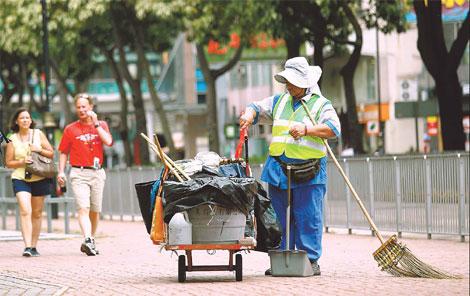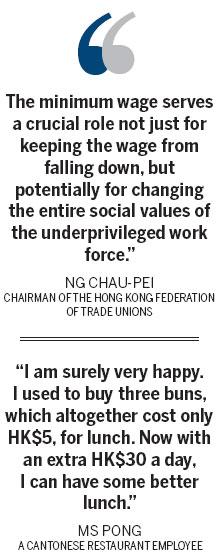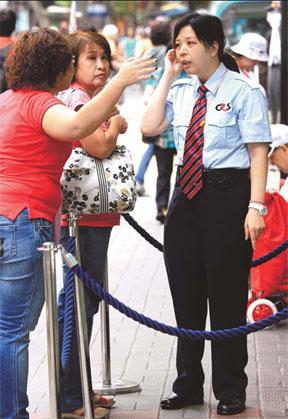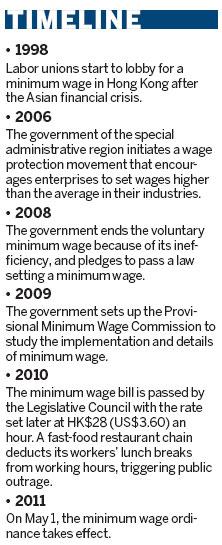
The beneficiaries of the minimum wage ordinance in Hong Kong are mainly security guards, catering workers and cleaners, who usually earn HK$4,000 to HK$6,000 a month. [Photo / China Daily]
Job fears grow as employers struggle with new rate, Andrea Deng reports from Hong Kong.
John is 75, a wiry wisp of a fellow. Despite a slouch, he works 12-hour nightshifts as a security guard in Sham Shui Po, Kowloon. He has been doing it day in, day out, for 15 years.
He gets HK$4,200 ($540) a month, provided he does not take holidays or days off. All his salary goes to pay for medical care and expenses for his wife, who lives in Shenzhen and has breast cancer.
Sometimes John takes a day off. He pays somebody to fill in so he can cross the border and spend the day taking care of his wife.
John depends on his HK$1,000 old age allowance for his own expenses, living on salted fish and preserved bean curd.
John's wages work out to about HK$13 an hour. But on May 1 the Hong Kong Special Administrative Region introduced a minimum wage of HK$28 per hour.
John's monthly income should have shot up to more than HK$10,000. It didn't.
"My employer told me, without any vagueness, that he simply cannot afford HK$28," said John, who insisted on anonymity and declined to give even a vague location of the building where he works. He was afraid he might be fired if the property management company finds out he talked to a reporter.
"I am 75 years old. I have no bargaining chip whatsoever. And I don't want to take the risk and take a toll on my wife."
What might happen

Perhaps John fell into the worst-case scenario pertaining to the wage ordinance, which was intended to prevent workers from being exploited by unscrupulous employers.
Many in the work force will see their wages shoot up, in some cases by several thousand dollars a month. Some will be sacked by companies that cannot afford the minimum wage or refuse to pay it. Some local small and medium-size enterprises will be unable to afford the increased costs and will wrap up operations. The rest of the city's hourly workers will see their raises offset by withdrawal of previously paid benefits.
The Provisional Minimum Wage Commission, which was appointed to advise the city's chief executive on the amount of the minimum wage, estimated in 2010 that some 274,000 employees would benefit from the ordinance.
It also estimated that about 40,000 people could lose their jobs if they worked for marginally profitable companies operating on the edge. About 1,700 enterprises were expected to fall from marginal profit into red ink.
"We knew that the least productive employees would risk being sacked because of the minimum wage, but that cannot dilute the fact that a larger number of employees will see their insulting wages being increased," said Ng Chau-pei, chairman of the Hong Kong Federation of Trade Unions.
The beneficiaries, Ng said, are mainly security guards, catering workers and cleaners, who usually earn HK$4,000 to HK$6,000 a month working more than 10 hours a day. Their occupations are widely considered to be the lowest-paying.
Ms Pong, an immigrant in her 40s who would not give her full name, works 10-hour days at one of Yau Ma Tei's most popular alfresco Cantonese restaurants. Her pay is going from HK$25 an hour to HK$28.
"I am surely very happy. I used to buy three buns, which altogether cost only HK$5, for lunch. Now with an extra HK$30 a day, I can have some better lunch." She giggled as she sat in front of piled-up dishes containing food remnants in a dark alley behind Temple Street.
The ordinance has even drawn some retirees back to the work force. Lee Tak-cheung, 65, is a night shift security worker at a residential building in Pak Kung Street, To Kwa Wan, one of Hong Kong's oldest districts and a place where seedy private tenement buildings abound.
He said he had been retired for a few years and started working again on May 1, the day the ordinance took effect. The salary stated in the contract is HK$8,000, compared with a previous offer of HK$5,000.
'Social values'

Some economists warn the minimum wage increase might invite a surge of unemployment because many small businesses cannot afford it. [Photo / China Daily]
"The minimum wage serves a crucial role not just for keeping the wage from falling down, but potentially for changing the entire social values of the underprivileged work force," said Ng, the trade unionist. He underscored that he championed a liberal economy and said that grass-roots workers have always been the victims when the economy fluctuates.
Terrace Chong, an associate professor in the economics department at Chinese University of Hong Kong, laughed at the idea that economists are pedantic robots.
"We economists wish that the market would function most efficiently and the price of the products float freely according to the market," he said. "But people are not products. Dignity is due to them when they offer cleaning services for someone else."
What about people like John, who work for a company that either will dismiss its aging workers or shut down its business, either way reducing John to unemployment?
Chong said strategies must be developed to extend the social safety net for such people by redistributing income or applying a portion of the Community Care Fund, a trust fund structured to help those who are in financial difficulty but are not covered by the existing social safety net.
On the other hand, John's case might be uncommon. Ng said that most enterprises will raise wages to at least HK$28, or face fines of up to HK$300,000.
Juggling costs
Some employers have been trying to offset the rising wage costs, typically applying such maneuvers as removing payments previously allowed, such as paid lunch and dinner breaks and holiday leaves, so the final payments will show only minor increases.
Catherine Yam, managing director of Centuryan Environmental Service Group Ltd, a cleaning and environmental services contractor with 2,000 employees, said the average cost increase for cleaning companies - mainly small businesses - might be 40 percent.
Her own company offered wages of HK$28 an hour before the statutory minimum became effective.

Tokyo Bakery, a bread company that employed about 200 people, announced on May 3 that all 30 of its stores would close immediately because it could not afford the wages, the rent and the rising food prices.
All employees were thrown out of work overnight, with their salaries, payment for wages in lieu of notice, contribution returns to the Mandatory Provident Fund, and holiday pay all in arrears.
Side effects
A handful of economists and prominent opponents of the minimum wage have spoken out about the side effects of the minimum wage increase, which might invite a surge of unemployment and hence greater wealth gaps. Two of the opponents are Francis Lui, professor and head of the business school of Hong Kong University of Science and Technology, and Richard Wong, economics chair at Hong Kong University.
Chong thinks the impact on employment may have been overestimated. The repercussions should have shown up as early as February, he said, because employers knew the wage increase was coming. In addition, he said, "The unemployment rate fell to a record low of 3.4 percent in March."
The trade unions federation has received more than 100 reports of employees being sacked because of the minimum wage. Most were security guards, cleaners or catering workers.
Yam said she isn't worried about unemployment. There is a widespread shortage of cleaners. The vacancy rate in the industry is between 10 and 15 percent.
Some union staff members think it is too early to speak definitively about the impact. Payrolls will not come into play until the end of May or early June.





